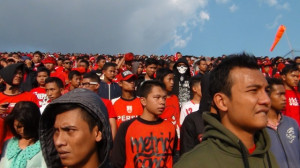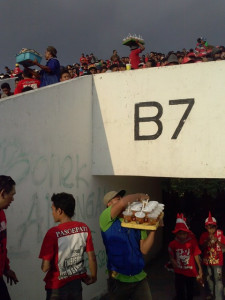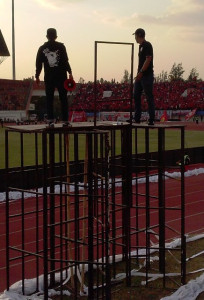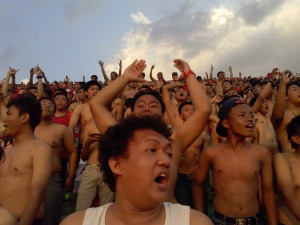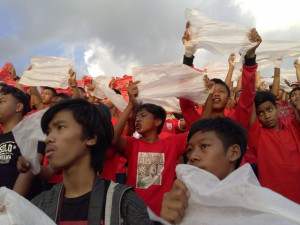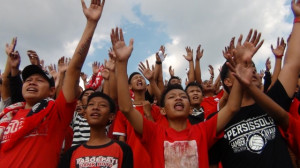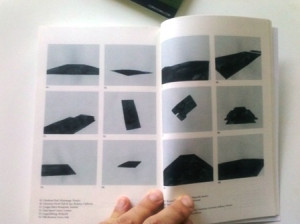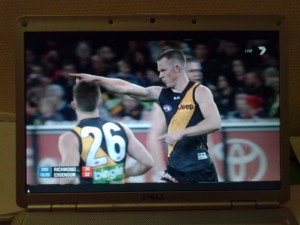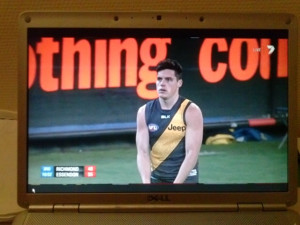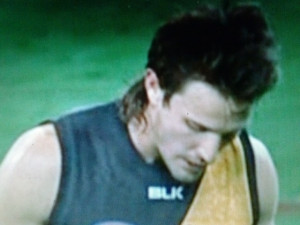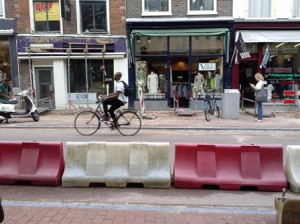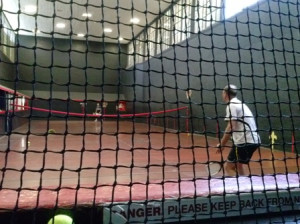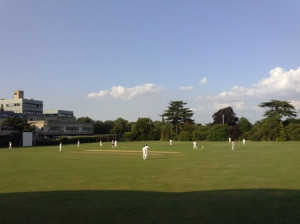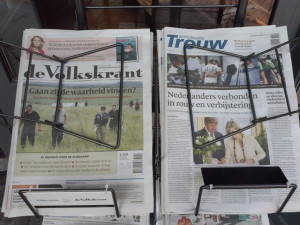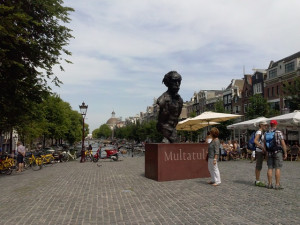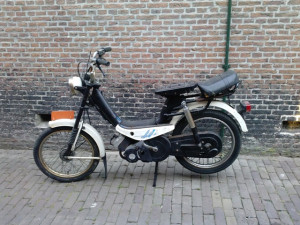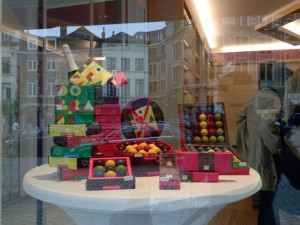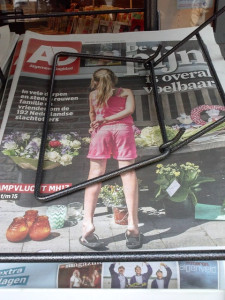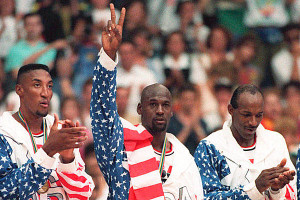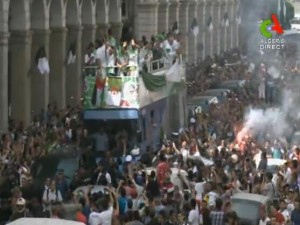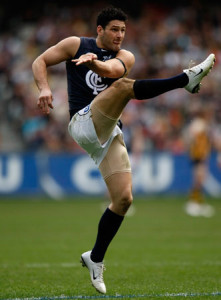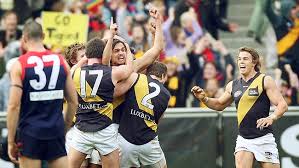 A translator of Indonesian literature, researcher, marathon runner and compulsive follower of the fortunes of the Richmond Football Club, Andy grew-up barracking for another team. Then he saw the light. It was the yellow sash. This season, he’ll write from abroad about the curiosities of his footy-life, and what he finds around him, and the pleasures only found in footy.
A translator of Indonesian literature, researcher, marathon runner and compulsive follower of the fortunes of the Richmond Football Club, Andy grew-up barracking for another team. Then he saw the light. It was the yellow sash. This season, he’ll write from abroad about the curiosities of his footy-life, and what he finds around him, and the pleasures only found in footy.
Traditional Rivalry
*not to do with Richmond
Before I got back on the train to Yogyakarta, my friend, Ramdhon said, “take your t-shirt off – it is better not to wear it in Yogyakarta, or even on the train.” Yogyakarta and Solo are seemingly locked in ongoing tensions: two nearby cities competing over claims as being the legitimate inheritors of ancient Javanese civilisation. Solo is on the rise after having been cleaned up and managed efficiently under Jokowi’s years as governor. And now he is President – no doubt a source of much pride for the residents of Solo. Yogyakarta, however, remains graffitied and un-green: in need of heavy dose of civic pride and public infrastructure.
***
The mid-afternoon sun was strong and bright: it was hot by most standards, but at least there was a green field in front of the supporters. Trees encircled the stadium. This was a crowd made up almost exclusively of young men, teenagers and boys. Anyone over 25 seemed old. Women were mainly working rather than participating in the watching. Nonetheless, a few young women, dressed respectfully in somewhat fashionable veils stood in their own section of the Eastern tribune of Manahan Stadium. The travelling team, PSGC Ciamis had virtually no travelling supporters. The 20 or so of their supporters had draped a banner over their corner of the stadium: Balad Galuh.
Ramdhon, a sociologist with a research interest in football fandom, states that Pasoepati generally maintain good relations with supporters of other teams. And in the case of Ciamis, – them being a small club – there is little cause for tension and animosity. The day’s conflict was between the referee and the Ciamis players. The main antagonist being Emile Linkers of The Netherlands, who after several and persistent assaults on the referee was belatedly sent off. Even after the match is halted three for the side-show of player v referee violence and police v player violence, most of the players still shake hands at the games belated conclusion. Ciamis, after being up 2-1 briefly in the second half are angry at having two goals disallowed and one penalty decision overturned. This was a game of much tension, excitement and relief for the Pasoepati fans of Persis Solo. The teams will meet again soon for the return leg in Ciamis. Persis can be relieved to head there with a healthy lead of 5-2.
One man with his back to most of the action through the game was Andre, or, Ajar, the dirigen (conductor) of the Eastern Tribune. This stand is also known as being the home to the supporters known as Pasoepati B7. The name is given after the main entrance gate to the stand. This stand is also identified by being favoured by the Pasoepati Campus supporters group. In between this Eastern Stand and the Northern Stand is the corner used by the fans who identify with (primarily) English hooligan culture. The Pasoepati Campus supporter group is made of up largely of students who come from Universitas Sebelas Maret, where Ramdhon teaches. Through his contact with the students, he is able to introduce me to some of the main actors and initiators of the artistic division of Pasoepati. Andre and his co-conductor stand atop a make-shift stand known as a steiger at the periphery of the athletics track that encircles the football pitch. They share a megaphone, perhaps indicative of slightly different and complementary roles atop their rather loose podium. And just like the conductors of symphonic orchestras, Andre is demonstrative, dictatorial and capable of expressing a wide range of emotions in quick succession. Ramdhon observes ‘these figures are very powerful. They are able to control thousands of people. Today there is about 4,000 in this stand – not even the police are able to control them. But these guys are.’
At the game’s conclusion, Andre greets the players as they do a lap of the pitch to thank the fans. Indeed, three of the four main stands have chanted almost endlessly for 90plus minutes. Andre is one of several dirigen who plays a key role in maintaining and developing the home ground advantage for Persis Solo. This game, is part of the play offs to qualify for the ISL and thus victory is particularly sweet as it brings the team a step closer to the highest league. Yet the final whistle was hardly greeted with a specific roar or cheer. The fans have stayed to thank the players and receive their gratitude in turn. Only then is the game/performance finished. After exiting the stadium, Andre, and probably other dirigen too, are greeted by the rank and file with the same reverence usually reserved only for players. Some have their photos taken with them. Andre is loud, but, unsurprisingly a little hoarse.
“I have been doing this for some six years. Previously, I was just a rank and file participant in Pasoepati, like all of these young guys. And then one day, I was asked to be the conductor. There was no choice in the matter. Suddenly it was up to me to take on the role. The regular conductor was absent, so someone had to replace him. I started out at the southern stand (tribune, a Dutch word, is the Indonesian word that is most commonly used). But, one time, I was asked to move to the Eastern stand. People were wondering, why is it so quiet? And so, I went there to make it noisy.”
“A couple of years ago, when it was already certain that we would be relegated (degredasi, in Indonesian) we had 1,000 fans still willing to travel to support the team. The journalist who goes by the name Jakarta Casuals on Twitter called us the most loyal fans in Southeast Asia. Having 40,000 to 60,000 or 80,000 fans in a stadium when you are champions is normal. What is extraordinary is when you get 1,000 fans still willing to travel when you know that the team will be relegated. I don’t use the words ‘win’ or ‘lose’; I simply focus on building the support amongst us fans.”
“It is not exactly easy being a conductor of these fans. At every game the crowd is just a little bit different. Our problem is the stadiums that we use. At games in Europe, the same fans sit or stand in the same place for every game, more or less. They know what to sing and how to behave. Sometimes I have to use a strong voice. It doesn’t mean that I am angry, it is simply because I have to give more precise and direct instructions. Just think, again, these stadiums that we use are not like those in Europe, where there is a roof over the crowd. Here, the noise goes straight up into the air and dissipates very quickly. If we want to be heard, we have to be organised. If we had a roof at our stadium, we would be on a par with the Kop at Liverpool, no doubt.”
This is not the only Liverpool reference of the afternoon. At the northern end of the pitch, there is a banner stating, “You’ll Never Walk Alone” draped over the fence. The Persis Solo anthem, Satu Jiwa by the local band Working Class Symphony, has been appropriated in the manner of You’ll Never Walk Alone has been by the Liverpool fans. Andre states that since the song is ‘so representative of what fans experience through football’ they asked the band for permission to use the song as the club’s and supporter’s anthem. IT is sun prior to kick off and at the end of games. Prior to kick off, players wait and stretch anxiously while the fans sing their utmost, arm in arm with one another, gently swaying.
***
A week or so after my afternoon with the B7 section of the Pasoepati crew, I meet up with some members of Brajamusti at a soccer discussion held by Football Fandom’s founder, Hasby, and Dimaz Maulana of Forum Bawah Skor. The day before the discussion, a photograph had been circulated on Twitter of myself talking with Andre. “When did you go there?” “When are you going back?” “I’m going next Wednesday. Do you have a message?” “Send them my greetings, from the Number 1 of Brajamusti”, Pak Eko says. There is laughter all round, but, the rivalry is undoubted. I went to Solo to have fun, to participate in the practice of being a fan and to do my research simultaneously. The self-given title of ‘researcher’ doesn’t always trump that of ‘supporter’: one is given loyalties and thus obligations, where one may not necessarily want them. The friends I have made through the Brajamusti supporter group ask what I talked about. I told them, I didn’t discuss violence or conflict – only that of their songs and the practice of being a dirigen. One of them tells me, when it comes to exploring the conflict between Brajamusti and Pasoepati, his information must be ‘cross-checked’. This is a moment in which the tension between partiality, trust and insight are threatened. I want both of their stories and I don’t care too much for their differences: I want to know what it means to be both Pasoepati and Brajamusti and I believe both of their mutually exclusive truths.
Being There
As a child, my parents would take my brother on trips to Adelaide every second Christmas. My mother grew up near Glenelg, home of the Glenelg Tigers, and thus she supported Richmond when she and my father moved to Melbourne in the very late 70s. Her brother in law, my Uncle Michael, had photos of Glenelg footballers in his pool-room that fronted out onto the pool. I remember him as a partying, drinking type. And then he had an epileptic fit while up a ladder: a brain injury followed. He became someone different. Or, not: rather, a different side of his character was revealed. Michael talked slowly and wisely. Warmly. Now, in one way, he reminds me the character Chancy The Gardner in the film Being There, played by Peter Sellers. The road trips to Adelaide were boring and my brother and I found Adelaide boring too. We’d be asking ‘are we there yet?’, probably some thirty minutes after having left Melbourne’s western suburbs. But the slowness of the city was countered by the more intense occasion of seeing cousins and friends. On the one hand Adelaide itself was boring, but being there was more familiar than being in Melbourne.
***
Surahno picked me up from the village of Tosari near Mt.Bromo in East Java. The day before I had done a preparatory 40minute run before doing the 10km race on Sunday 7th September. I was wearing an Arema football shirt: navy blue with a broad yellow stripe down the middle, adorned with sponsors’ logos. Occasionally, locals would shout back ‘Arema!’ at me as I ran mid-tempo past. Wearing the shirt was part method of ingratiating myself with the locals and also part of my slow effort at collecting Indonesian football paraphernalia. I ran with a 27year old man from Jakarta, now living in Probolinggo. His name is Zapata: after a Mexican footballer of the 1970s. He’s been sent to peripheral Probolinggo by the bank he works for and was able to make the two hour motorcycle journey to Tosari for the Bromo Marathon event of which included a 10km, 21km, 42km. He looked like a runner: light frame, little fat. I asked him which event he was doing; ‘the full marathon’, he replied. ‘I haven’t done one before, but I thought, what the heck, I’ll do the full.’ I asked him about his training: ‘I run once a week.’ Yikes, me thought. Once a week! The last time I checked, running a marathon adequately requires training of four times a week (minimum) for three to four months. The course would be steep; perhaps I should have told him to reconsider his choice.
While waiting for the shuttle bus from Wonokitri – the starting point for the following day’s races – I met a couple from England. One was a Liverpool supporter, the other a Crystal Palace supporter. I told them that in terms of EPL, I was relatively biased towards Liverpool, but, was considering switching to Crystal Palace, after their brilliant performance last season and Mille Jedinak’s stoic captaincy. The male of the couple told me that the EPL was too soft now; too much diving. I told him, ‘so rare to meet a Liverpool supporter actually from Liverpool’. I wondered how he must feel seeing 100,000 Jakartans or Melbournians bellowing You’ll Never Walk Alone out before a Liverpool exhibition match. Loyalty, fandom is indeed something learned and practiced. Hmmm: perhaps just a little like doing a marathon – one has to work hard at it to become legitimate and accepted by others within the fraternity. On the same bus I spoke briefly with a guy from Singapore – he had come to East Java just for the race. I asked him which event he was doing. Like Zapata, he was doing the full marathon. Like Zapata he had done no training. The female of the couple, the Crystal Place supporter was doing the half. Training? ‘I haven’t done any training. I don’t think training in [very flat] Solo can prepare one for running in [very hilly] Bromo.’ Hmmm. I mentioned I was doing the 10km: this was flat out unheroic for them. I told them: ‘I don’t want to suffer’. But this was only part of the story: running in such mountainous terrain would always involve a degree of suffering. I’d just prefer it to be limited to 10km rather than 21km or 42km.
Surahno drove us towards Surabaya. We stopped for lunch in Pasuruan: the town from which some folks who were staying at my home-stay had come from the night before. It was stinking hot and I still hadn’t showered after finishing my race. The restaurant was open and airy. Surahno, full of some 15 years experience as a driver, mainly throughout Java and Bali, gave his quick assessment of the restaurant. ‘It won’t last five years. It’s too expensive. People drive quickly along this stretch of road. None of the locals will stop by here. This is aiming at middle-class to upper-middle class. The restaurant should target middle-class and below. Then there will be sufficient turnover. First they’ll be holding back on buying fresh produce, then they’ll cut staff, then they won’t keep up with the maintenance. And then it will close.’ Nonetheless, the food we were eating was fresh and the restaurant was clean. I bought several plates of vegetables and finished with a coffee + condensed milk: a drink I’d been avoiding for some time. We sped towards Surabaya along the toll road and I put on my headphones as the condensed milk caused some minor consternation in my stomach. I listened to Talking Heads’ Remain in Light and Emmylou Harris’s Hard Bargain. My legs were aching and I stank. But I was full and satisfied with my race.
***
Throughout the journey downwards from Tosari to Surabaya, the Tiges were playing out their final. I had told myself to watch the game only after it had been completed: I didn’t want to get interrupted updates of the game. After seeing family, and then doing some daily tasks, I sat down in the lobby of The Dharma hotel in the Dharmahusada suburb of Surabaya. I sat on a flat bench of a couch while the staff chattered away. I had my headphones on. While waiting for the first quarter to load, I wrote some emails and avoided Real Footy, Twitter, Richmond FC.com and AFL.com. Every game is a tragedy, I tell myself before each game. If it is not a tragedy for my team, it is a tragedy for the other team. Dreams and hopes are smashed within two hours. And then of course, the players console themselves and do it all again the following week. Our team got smashed in the first quarter; the rest is irrelevant. Port played perfectly. Our beloved Tiges, were just playing at being there. Dusty bumped off the ball by one of the lightest men in the competition; Bachar bounces the ball backwards: the horror, the horror, the horror. But no: let’s not hold it against our Tiges. It was not to be. Nathan Foley, come back for more; play with your vigor, show us all your resilience. This cannot be your one and only final.
Win, lose, whatever
Always Richmond
Always forever
Richmond Orgasm
Nine years ago I got up early one morning to watch the Champions League final: Liverpool vs AC Milan, live from Istanbul. It was dark and quiet on Richmond Terrace. My brother and I somewhat drowsy and sleepy, but, with some kind of enthusiasm for watching Liverpool in the final. We had both adopted Liverpool as our team as children, and in the 2000s my brother, Thomas had followed them more closely. I was taken up with The Tiges. And so at half-time, the game was or should have been done. A goal from Maldini in the first minute, a couple soon later from Hernan Crespo. ‘AC Milan now playing football out of this world’, the commentator said. Teams don’t come back from 3:0; not normally and especially not in a Champions League final. It had been good while it lasted. At least the outcome was clear and we’d be spared the agonising tension of a nerve testing second half, say, if it were two all or some such score. The Reds fans had left Merseyside to be Bosphorous-side and their trip seemed in vain.
Early in the second half, we should have been back getting some sleep, but Gerrard scores and the commentator says, ‘hello! Hello!’ Gerrard runs back to the centre. He knows. Gerrard the legend: before he slipped up to play a hand in Liverpoool’s letting go of last year’s EPL trophy or handing a goal to Luis Suarez in the World Cup. Three wild swings of his arms gesturing towards the Reds fans who now roar like the renowned Carsi fans of Besiktas. ‘Steven Gerrard has sown a seed of doubt into Milan hearts’. Sometimes a pause in the game gives just enough time for a poetic flutter. Oh beauty. Two more swings of his arms – perhaps this time to his defenders. Conviction shown by a leader. Others will follow. Come with me. A goal from Vladimir Smicer: two in two minutes. He turns and wheels around: Chappy-esque – arms out-wide. Mouth agape. A roar. A tigerish roar. He knows, too. He’s proven the presence of hope. Penalty to Gerrard, against Gattuso. Alonso, pre-Real Madrid, has his penalty saved, but is quick enough to smash in the rebound in a scramble. Go you Tigers. Milan have chances to win; The Reds have chances to cough up what they had fought hard to save.
For months afterwards, my brother, in search of an instant hit of euphoria, in between writing his doctorate, would switch on 10 or so minutes of a recording of the game. I’d come out of my room at the front of the house and he’d have a smile plastered from one ear to the other; watching in a daze. Yes, it was possible. Oh you doubters, you can have so much fun with your nay-saying. The soundtrack of the commentary became the soundscape of the living room of our little place on Richmond Terrace. And then, he’d resume his study, working quietly, perhaps just a little buzzed up by Gerrard’s antics, Smicer’s long-range goal and his doubtless penalty. Oh the hit of a comeback win. In that glorious city of Istanbul: with its music and food and etiquette, but also with its political troubles, its anger and its tensions. Mythical Istanbul was mythical Liverpool’s for a night. The Reds fans left, leaving just a piece of themselves in that great city whose legend had just increased a slight fraction.
Oh you Tiges. You went to Sydney and won. 3 points, no Buddy – I don’t care. A win is a win. No caveats. I can’t remember a moment of the game. I can only remember the sound of the panicked Sydney crowd: urging their team to be as good as the Tiges. I remember the sound of the commentators – no Bruce saying, ‘the Tiges really need to get one here or it could get ugly’ blah blah blah.
Dugald’s article in Friday’s paper was met with the usual cynicism from those who make comments and aren’t open about their identity. Dugald spoke of our footy dreams. Damien Barrett, chief cynic, wrote that the Tiges had no chance. He doesn’t believe in hope; he doesn’t believe in the play and theatre of sport. Him, the poorer. Footy is nothing but a job for him. The Tiger’s comeback from 3:10 is Istanbulish, Liverpoolish.
Which win was the most beautiful of this 9 on the trot? Each bloody one of them.
I’m taking the week off to dream.
Painting After Playing
I met Rupert at a concert by The Necks in January 2010 at the Corner Hotel: spitting distance from Punt Road oval. I was talking with Tina Douglas, a Melbourne-based painter, before the show. She had brought her friend, Rupert along with her. He was agitated, talking a lot – annoyed about something. I only exchanged formalities with him. Curiously, he left before the show started. The Necks played their usual two sets: one hour-long piece, slow and improvised, followed by a shorter, probably 20minute piece after a beery interval. Mesmeric, atmospheric, hypnotic being the usual words the crop up when talking about The Necks. There’s something special about seeing their music unfold live. Something that can’t be captured by listening to it on CD or through one’s little machine.
It was only at the end of the concert, that Tina started talking about Rupert. She talked about him being obsessive and never knowing anyone so fully taken up with their own painting. She mentioned how he used to be a footballer, but, he had given up after a falling out with the coach. She didn’t mention the names ‘Collingwood’ or ‘Mick Malthouse’, but, it slowly clicked that the Rupert who had been earlier and then left also early was Rupert Betheras: a member of Collingwood’s grand final sides of the early 2000s. He was also known for his role in bringing Liam Jurrah to Melbourne: a venture that would have its own trajectory. Rupert was known as an industrious player; hard working and probably not the most ‘naturally gifted’ as they say. I remember him playing in long sleeves. I also remember that I liked something about that valiant Collingwood side that only lost by a couple of goals to the mighty Brisbane.
***
Leanne Shapton, Swimming Studies, London: Penguin Books, 2012.
Here is Leanne Shapton’s website: leanneshapton.com
I am reading Leanne Shapton’s Swimming Studies, yes I am.
Shapton is a Canadian artist and former elite swimmer, who almost made it to the Olympics. Nowadays, it seems that she is equal part author, publisher, illustrator and recreational, but regular swimmer.
Swimming Studies tells the story of her rise as a swimmer, or rather, her experiences as a competitive swimmer. For, in this book at least, she cares little for the glory of winning or setting of personal best times. Instead, she focuses on the sensations of being in water, of using her muscles, and the smells that are a part of the everyday life of a swimmer.
The book – perhaps it is most easily classifiable as a memoir – is also a tale of family and domestic life. Leanne shares her swimming with her older brother, Derek. She eventually becomes a faster swimmer than him, for she has, according to her coaches a natural affinity with the water. She asks if it bothered him and he replies to say, no, ‘it meant more to her’. Yet, Leanne never really betrays this sense of full emotional engagement with her competitive swimming. Although she states that, at one point, she is ‘clinically depressed’, this is not directly linked to her swimming. It’s just another temporary sensation. The reader is only left to guess that perhaps it might be.
Shapton seems to swim because she is good at it. And that it is something she has grown up doing. Swimming is a skill that she has developed through her 5am morning practices for which she depends on her mother’s endless to-ing and fro-ing from training. There seems to be much love between them; but, it is not the tenor of the book. Shapton instead recounts the smells and rhythms of her mum’s life, rather than stating open affection. Her mother becomes another part of the aesthetics and everyday life around the thing of swimming.
Swimming Studies is enhanced by the inclusion of photographs of the swimming suits Shapton has collected throughout her times as both elite and recreational swimmer. The suits are neatly photographed on a vintage cloth mannequin, and each suit is accompanied by a brief note on where it was brought and where she wore it for the first time. The suits give an indication of the the changing attitudes towards the female body: something to be covered as much as possible, to being something athletic and capable of moving fast. The suits shift from hindering mobility to enhancing it.
The shapes of pools
Shapton addresses swimming in an original manner. She remembers the textures of swimming, its smells and its sounds. Her portraits of other swimmers, her re-drawing of the shapes of pools (above) and her paintings of swimmers swimming capture something very watery about the feeling of swimming. For me, the weakness of this book is its relative absence of plot or central focus. The plot, the subject matter, the focus are somewhat diluted. It feels like reading a series of disconnected notes on the practice of swimming. So be it. Perhaps it is aimed at being a Walter Benjaminian encounter with the overly focused and directed world of competitive sport. The strength for me, of this book, are the very personal and bare insights Shapton gives regarding her ambivalence as a swimmer. The inclusion of her paintings make up for any textual weakness.
***
There is a helluva lot of action in Betheras’s paintings. His paintings are full and thick. There is no place for the eye to rest. They must be made quickly – at least in the After Collingwood (2008) series. Marking Tracks (2011) indicates a quieter, more refined style. Finally some empty spaces emerge on the canvas. A difference between Shapton and Betheras is in that Shapton makes her painting from her experience as a swimmer; what she learned as a swimmer. Betheras’s works are an indication of someone breaking away from his identity as a footballer; leaving footy, perhaps. And thus, in one image, there is a Collingwood player with its face erased. Betheras must have been an enigmatic footballer to Collingwood fans; for indeed, so few players give up the game when they can still play it. Moreover, he gave up the relative fame of being a footy player in Melbourne for the insecurity of being an artist. Shapton and Betheras that the doing and playing of sport is a productive partner in the development of an aesthetic.
What Makes a Win
How is a victory made? I’m trying to think of what makes this win against Essendon feel the way it does.
Probably some seven weeks ago, Damien Hardwick was asked what the team needed to get out of the season now that it was effectively over –i.e. having no chance of making the finals. He replied to say, ‘we need to win. We need to give something back to the fans.’ He also said that the Tiges were a better side than what they seemed to be by their 3:10 record.
This was a risky statement to make. It would have been easier for him to talk in generalisations, about improving more generally so that they would be able to be in their best form for 2015. But, he put it simply: wins on the board, now. Ugly, boring, grinding – matter.
***
The first five wins of this streak have been underwhelming and forgettable. The thousands of disappointed fans and members have been slow to get back on board – burnt by the early to mid season listlessness of the team. Perhaps they have been somewhat unconvinced by the pedestrian nature of the wins, coming against team playing beneath their best.
Imagine, for example, if the Tiges had beaten Port Adelaide at the Adelaide Oval in the middle of their streak, their hot form, with their masses of fans creating that wonderful sense of game day. But no, it happened at the Telstra Dome – or whatever it is called – with a small crowd and those who were there were probably already feeling put out by having to attend a home game at an away venue.
The AFL has a tendency to overstate the centrality of football in the lives of the good citizens of Melbourne and the surrounds. And thus a crowd of some 70,000 was hoped for. Damien Hardwick and some of the Richmond players, though, should be commended for recognising that the team had done much to disenchant and disappoint the fans. The disappointment of this season being felt all the greater because of the high expectations that the Club built up over the long cricket-full summer. The crowd turned out to be 58,000.
The consistent excellent form of Dustin Martin, the instant arrival of Miles as a player (after his much anticipated debut for Richmond) and the development of Riewoldt into a much more rounded player couldn’t provide sufficient succor for a team and fans expecting not only to play in the finals, but also for a win in September. The righting of the good ship Richmond has been as sure as it has been unspectacular. Until Friday night that is.
***
I had planned to watch the game live. But, I got caught up in a long Skype conversation and so, rather than resuming watching the game from third quarter, after having seen most of the first quarter, I watched the full replay from the second quarter onwards, some six hours after the game’s completion. A media blackout was enforced for those hours in between.
For twelve years I have loved the jumper. For twelve years I have been with Richmond. I have not been to as many games as I would have liked. I have been far from 3121 for the past four years. But followed them I have. Each summer, I have been convinced that the next season would be ours. Folly and naivety most think. I have admired our good players; I have respected their characters. I did my best to find something good to say about Terry Wallace during those years and many days in which he came under so much criticism. Much of it warranted. I wrote him a letter: wishing him all the best, despite the difficulties. I wrote Danny Frawley a letter after an uncouth fan spat towards him. Frawley, polite, replied and wrote of the many other fans who had also voiced their outrage. I gave Richard Tambling the benefit of the doubt: he would become a player in the right circumstances, I was sure. I almost cried with happiness when the Tiges thrashed the Hawks in the wet at the MCG a couple of years ago. For twelve years I had loved the jumper and admired the players. But it was Friday’s game in which I fell in love with this team; with each of the players; one by one; one at a time. Purely platonic, of course – I don’t want Brian Taylor to get uncomfortable.
In days gone by, with the luxury of watching the replay, I would have skipped to the end. I would have checked the result on Richmond website to see if it was safe to continue watching. But this time, I stayed put. My knees against my chest, peeking out at the screen. I convinced myself that ‘surely this is more stressful than watching soccer’ – longer than 90minutes and so many chaotic possibilities. So many players who could make a single mistake that could lose the game for the team. I thought of Cameron Wood’s mistake against Freo a couple of weeks ago. I thought: how ironic – Richmond are playing so well, so beautifully – just as we want them to, but, we might suffer a tortuous loss.
***
On the commentary, Bruce kept on writing Essendon off. I don’t know why he does it. Bruce seems to belittle the opposition. ‘One more goal here could make it really difficult for Essendon’. Didn’t he see last year’s Brisbane-Geelong game up at the Gabba? Didn’t he see the third quarter of Richmond-North Melbourne this year? 30 points means nothing. But despite even Bruce’s best efforts to put the Mozz on Richmond, the Tiges didn’t wilt. I saw the superb skills of Dyson Heppel: a player I couldn’t really appreciate up until now. I saw the stoicism of Paul Chapman; the ingenuity of Goddard: two players who were perpetually on teams humiliating my, your, our Tiges. Tonight, not so. I see Goddard depart the field: frumpy and bad-tempered. His nose put out of joint with this team now in jeopardy of missing the finals.
Enough of them. Brett Deledio: let him be underrated never again. He is athlete, aesthete, footballer. Edwards: so light on his feet, adroit, lithe and balanced. Miles: the man is tenacious. Gordon: he came to the fore – not for long, but, when his moment came he was there; and he delivered. Griffiths: the MCG is your play thing.
But my moment of the match came a few seconds after Ivan had marked Ben’s long kick into the forward line during the game’s dying moments. Ivan lined up; the siren sounded –the crowd roared, roared, roared. And Ivan – did not blink. No smile, no relief, no nothing. The man was looking in between the goals: that is where I shall send the ball. And goal he did. No concentration lost by that booming projection announcing the Tiges as victors. Ivan the Maric. And the team swamped him.
This was a win for the Believers. Ivan believed in the Tiges when he no doubt told the Team that they could be better. Ivan believed that the Team could respond to criticism; to take it on board and then improve and improve some more. Ivan leads by example and the Team follows. This was the Beautiful Game.
I Believe – On the Tiges and TTBB
I have watched the last four games relatively closely. I watched the game against Greater Western Sydney. It wasn’t pretty: it wasn’t one for the ages. By the end of the season, all we’ll remember is the result. And so now, it is 8 wins 10 losses. Beats the hell out of 3:10 five weeks ago. Perhaps I was too negative then. Perhaps I’m too optimistic now.
Methinks we can win four of the next five games. I don’t know if we’ll make the finals or not. I don’t care. I want to see the Tiges win on Friday night and then win, win, win. And, if they have to do it against the Swans to make the finals, well, so be it. I want the season to continue for one more week. I believe the Tiges can beat the Dons. Perhaps the team is not as good as we thought before the start of the season. Perhaps they’re not as bad as we thought when they were 3:10.
These wins have largely been forgettable, for me. But, perhaps because I haven’t been there: I haven’t taken a bus, a train, walked or ridden to the games – whether it be alone or in a rowdy group, full of hope and then annoyance at a lame performance, or of course full of glee after a win. Watching the game through the AFL’s live streaming is always a compromise and it can’t ever substitute for being there.
Watching the game through the streaming fits even less with one’s daily schedule and with that of those around oneself. I go to the market at half time. I go for a run at the game’s conclusion – and no-one around me knows the score or cares whether or not Dustin’s had a good game. Watching the footy locates oneself elsewhere: a kind of voluntary homesickness. But, I don’t feel homesick – I like it here, even though I don’t speak the language and always feel like an outsider and a temporary resident.
***
I want to state my support for Dugald’s and Chris’s venture of Tiger Tiger Burning Bright. I got to know Dugald last year through my correspondence with him. He answered my emails – promptly and politely. I admired the dedication with which he was writing TTBB. I felt very much that he captured the mood of many Richmond fans. For the first time, here was someone giving recognition to the thousands who come to watch the Tigers play. I haven’t met Dugald in person. And I might not for a while yet. But, I know he is reliable, honest and dependable. He has the qualities of a friend. I don’t drink, but I might take it up, just so that I can answer the question of where I am, asked down a mobile phone: ‘I’m just having a few beers with Doogs at the London’.
I met Chris only when I started to contribute to TTBB. He has often been the first to comment on my pieces. He has appreciated what I have written for TTBB. He has worked hard in developing TTBB. He is not only a wonderful designer, but, also writes clearly, straightforwardly and he is open about his life. I have not met Chris in person, also. But I would like to. I believe that when we meet, footy will only be a part of what we talk about. We’ll talk soccer, art, literature, family, travels and much else besides.
Olden days tennis, Oxford
TTBB doesn’t run automatically: Chris and Dugald make it alive. In a season which went downwards rapidly and has only stabilised recently, Dugald and Chris have maintained the Tiger focus. TTBB is about the broader culture of being Richmond, being the Tigers. Their work represents many; but, last year the Club chose not to support TTBB. Perhaps it will one day. I wanted to write for TTBB because it presented me with an opportunity to write about ‘footy’ and ‘sport’ more generally. I felt the easiest way for me to support Dugald and Chris was to offer my writings for TTBB. They generously gave me a column. They said, ‘write what you like Andy’. ‘No strings attached.’
***
I started writing on footy because I wanted to broaden my areas of interest as a writer and a researcher. I did my PhD on Seno Gumira Ajidarma, an Indonesian author who has written a lot about the great city of Jakarta. Through reading his short stories, I became more and more interested in urban culture. And then, I realised the importance of sport in urban life. And I realise that ‘sport’ is ‘culture’ just as ‘literature’, ‘the visual arts’ are. So, although Seno’s novel, Nagabumi (a historical novel set in the 14th century throughout Southeast Asia) might seem far removed from the MCG on a wintry afternoon with Reece Conca getting a little hot under the collar, there is a winding pathway between them. This is the privilege of a writer: to be able to justify anything, in the name of making it a subject for her or his writing. All the better if one is paid for it.
***
Go Tiges. I believe. We believe. We’ve been winning ugly and unspectacularly. And five wins in a row don’t happen by accident. Let’s now win beautifully, authoritatively, joyfully.
Men dressed in white, Oxford
What makes violence
As Ty Vickery strolled to the bench a couple of spectators shouted angrily towards him: he had knocked out Dean Cox and riled the West Coast players and their fans. Cox’s elbow into Vickery’s chest, a moment before the knock-out blow, became irrelevant. Just part of the game. Vickery’s wild-swing became a headline and a reason for an apology. The swing was disingenuous: as his fist struck Cox on the point of the chin, the ball was nowhere to be seen. Ty will be taking a holiday – I’m thinking four weeks minimum. Ty’s apology will do little to placate the tribunal – and indeed it shouldn’t. Ty took Cox out of the game and could have potentially seriously injured him.
But, I’m wondering that just perhaps, the spectators’ anger was somewhat also related to the rather pedestrian nature of the game up until that point. West Coast had been subdued by the Tiges and Ty himself was playing well. Ty, so long a cause of frustration for many Tigers’ fans, had begun to show a greater assertiveness on the field. He had started to attack the ball more convincingly. I’m also thinking he is looking much stronger around the shoulders and arms. He seems to have grown into his body, so to speak. The home ground advantage had been neutralised by Richmond: for whatever reason, the Tiges like playing at Subiaco. Even some of their defeats haven’t been so ignominious. Perhaps the Eagles fans yet again sensed a disappointment.
A couple of weeks back Ty was being interviewed after he had played a solid game – perhaps kicking some three goals or so. Prior to the game, Luke Hodge had singled him out as being a potentially important and pivotal player to the Tiges success or failure that night. And, Ty showed that he was. He played well and the Tiges won. After the game, Ty laughed shyly when the interviewer mentioned that Luke Hodge – that symbol of tough stoicism – had stated his support. Ty: ‘well, I’m glad that he had faith in me’. He is aware of his status as one of Richmond’s doubted players. But, he also indicated a degree of genuine modesty that is uncommon amongst the macho bravado of footy players. I hoped that this would convey something to the fans who abuse him or shout at him during games when he doesn’t perform well or spectacularly. The game needs players who can express their sense of doubt about their talents or ability to play the game at the highest level.
I don’t know what Ty said to the spectators who abused him. The spectators did so because they knew that they could get away with it. The fans were performing to the cameras: they could have been confident that their actions would be replayed. If this was the greatest crime that they have witnessed throughout their lives, then they are lucky men. Perhaps Ty said: ‘I am wrong; I knocked out your man. I read the newspapers though. We’re all guilty. We’re all implicated in this culture of footy in which we seek by any method to win. If we can make a hard hit on a player within the rules, all the better. I deliberately hit him while pretending to be competing in a ruck contest. My fault was that it was so clumsy that it was so poorly disguised.’
And meanwhile, elsewhere, in an unending war, some thousands of civilians have been killed. And we watch a game and partake in its endless media cycle. Oh what a luxury to be angry at Ty. Oh what a luxury to see our team winning, losing, winning and losing some more. We watch and forget. Let’s just hold back on the mock indignation at the crimes of others.
The Overhead Lockers Landed in a Sunflower Field
Fragments
/1/
There is a Ritual Salts bag lying in a field in Eastern Ukraine. The farmer, Valeriy Sulyivka who picked it up and who saw the suitcase in which it was packed fall, doesn’t care for Breestraat in Leiden, but that is where the passenger Hans Noteboom bought his gifts for his wife. He bought some moisturiser – specific to her preference and some vitamin facial cream. The Ritual Salts bag was un-torn and neatly folded. This indeed would be a nice gift for his own wife. Whatever the creams were, it seemed that there expensive. Whatever the case, they were exotic and in smart bottles. And then he left them; they weren’t his business and his wife wouldn’t care for such products after all. And then Valeriy continued on his morbid journey throughout the sunflower fields: inspecting more bodies, seeing more goods, turning a few over. He left them be, but, he did take a belt that was in a pair of jeans that was dangling out of a small suitcase. He needed a new belt after all. The war had been going on for some time now and only now with the arrival of civilian debris and the civilians themselves had their lives become interesting to others.
/2/
I’m sitting at the cafe on the bridge next to one of the town’s ice-cream shops. I’m about to order my sandwich and the waiter asks where I am from. I tell him, ‘I’m from the country that is ranked one below Cape Verde in the FIFA world rankings.’ It is his second day on the job and he has shown his nerves by asking, ‘what would I like to order?’ An ‘I’ instead of a ‘you’; oh, details, details. He doesn’t take the bait and moves onto the next customer who I am sitting with. ‘I think he doesn’t like football’ says Sander. I say, ‘I think I don’t like being asked where I’m from in such a manner’. And then I tell Eric and Sander, my two lunch companions whom I have bumped into per chance, ‘the funny thing about Leiden is that, unlike in other places, it’s not the tourists who always stand out, it is the locals. The locals are so loud, noisy and take up so much space. Whenever one sees someone walking carefully and aware of their surroundings, talking in a soft level, one immediately can detect them as being Spanish or French or German.’ ‘What about Americans?’ of course Sander asks. ‘Oh yes, well, they’re the exceptions.’
/3/
Jens runs twice a week at the Leiden Athletics running club. He trains on Tuesdays and Thursday nights with a man called Ad. And as usual, on this early Tuesday evening, the group of twelve so runners are running gently and slowly through the local wooded area. This is the warm up, before doing a series of long sprints around the track. It is officially called a forest: but there are no opportunities for getting lost and there are clearly delineated paths. The Netherlands – so contained bordered, structured and man-made. Jens is talking with Simon – an Australian visitor, ‘did you know anyone on the flight to KL?’ The answer is no and they continue their chit-chat. And then, ‘my boss was on the flight.’ Someone else asks, ‘you’re boss boss, or your immediate boss?’ ‘No my boss with whom I work, with whom I must answer to.’ And then the coach, running slightly ahead says, ‘I’m going to a BBQ later to a village where two of the young men come from. They were both 28.’ The group of twelve or so runners emerge from the forest and into a clearing. There is a wedding taking place. Tables are lined up in the late afternoon, early evening sun. Gentlemen and ladies dressed neatly in bold and bright colours. Children play nearby on the lawn. Jens says, ‘the taxi driver came into the office saying, it was me who dropped Hans off at the airport. People tried to contact him on his phone, but there was no answer.’
/4/
The radio talks footy down the internet: Forward of centre. Plays on. Tries to kick it further on. It’s game on in the second half. Kicks it out of the congestion. He’s on four disposals.Did enough. Handpass. Worked it out pretty well. Didn’t take the mark. Survives at half-back. Clears the benches. Going very early. Didn’t do him any favours. Well set, though. Who marks at right half-back. So, having a run at half-back. Centers it up. Had a piece of it. Locks it in underneath him. Inside the centre square. Still just two goals. And one. This will be holding the ball. Cut it off. Kick is no good on the way out. Flops into the arms of. Will be able to take the shot at goal from close in. Gives them a bit of a sniff. Not half as good as their opponents. Stabs it through for a goal. They’ve got to get a double up now. Authority and precision and put their imprint on the game. It has got to happen now or it can’t happen. Playing seven forwards. Got to man em up. Decisively. With the tackle. It was free kick for high. Win it back again. Missed. Comes up with it. A couple of advantages that didn’t really advantage. Left half forward. Like he thinks he can kick it. So far in this game. Let’s see how the ruckman goes. No chance. Towards the square. Handballs. Deep in the pocket. Play within their capacity. At the throw-in.
/5/
Militant 2: It’s the Cernukhinskis. It’s the Cossaks who stay in Cernukhinks, from their post.
Militant 1: The plane disintegrated in the air, above Petrapovlovskaya, we found the first 200th – a civilian.
Militant 2: How are you doing there?
Militant 1: It’s pretty bad. It was civilian debris falling in people’s yards. Fuck.
Militant 2: Any weapons?
Militant 1: No nothing like that. Civilian objects, toilet paper, pieces of medical objects, towels, that kind of rubbish.
/6/
Breestraat is being renovated: it is having its guts ripped to pieces operated on and inserted with all sorts of new wires and tubing. They’re making the footpaths wider and reducing the number of buses that pass down the street. Moreover, they’re dropping the speed limit to 30km per hour. The Ritual Salts store is opposite the Gemeente, the Town Hall. The flag hangs at a half mast. The woman dressed in a white shirt and black apron working behind the counter thinks of the customers she served on the mid-morning of Thursday 17th. The news agency sells the newspapers that channel anger. And people talk quietly and sternly at their running group meetings about the futility of grandstanding; being aggressive. Jens says, ‘little work got done today’. Ritual Salts is yet to and unlikely to open a branch in the Ukraine the customer service clerk tells me.
Get Your Logo Off Our Jumper
Chris Rees wrote an article recently, imploring the RFC for the team to ‘go clean’ in 2015. He included a photograph of Trent Captain and others wearing RFC jumpers with the Jeep logo missing. Rather than appearing ‘original’, the jumper appeared a little naked. We have become so used to seeing the jumper adorned (or besmirched) with advertisements that what is actually a kind of visual pollution, has become the norm, rather than the exception. Rees’s argument is convincing. Rees argues that the RFC, in order to win back some credibility after its appalling 2014 season (it was over by June), the Club should show that it is aware of its traditions and willing to give some substance to its forever repeated phrase, ‘like the Tigers of old’. The team of 2014 are not playing to win; not fighting and fighting until the end. They’re soft and indifferent. This is virtually the same team that played so well and captured the enthusiasm of many other teams’ supporters throughout 2013. This is a World Cup year, so there is plenty of other football to watch. But, no doubt many Tiger fans would still prefer to be enjoying their local team playing the local game.
Rees argues that the Club should remove the advertisements of Jeep and Bingle from the Team’s jumpers (front and back) and shorts. Hell, they’re probably on their socks too. Well, if they’re not, perhaps there is more advertising space. Given the Club’s history of ignoring its fans, it is unlikely that Rees’s calmly reasoned, logical argument will be given the time of day inside the (proudly impenetrable) four walls at RFC Headquarters. Perhaps an easier way of convincing the Club to re-consider the corporatisation of the RFC jumper is to first convince the players.
***
The primary problem with this though is that the players themselves already have seemingly direct individual relationships with the Club’s sponsor – Jeep. The players themselves drive Jeeps. For them to be seen in a Jeep furthers Jeep’s image as a sporty, macho and tough car. The late Tommy Hafey also drove one. He was a Tiger of Old – one of the men whose legend is central to the myth-making at Tigerland. Unlike the current team, however, Tommy was resilient, gutsy, and of great integrity. If he received a few easy bonuses late in his great life, well, he bloody well deserved them.
Hashim Amla, a South African cricketer, is one player to have stood up to his country’s sporting board and to have asked to wear a shirt that doesn’t bear the logo of a company he doesn’t believe in. Amla is no ordinary cricketer – arguably one of the best batsmen in the world. He has the statistics, reputation and respect of his peers to back this up. He is well-liked in his team and popular amongst his countrymen and cricket fans throughout the world. Why? He is non-fussed and he scores runs easily and plays in the spirit of the game. Because of his integrity, consistency and straightforwardness, the team’s management acquiesced: they let him wear a shirt without the Castle logo. A little earthquake; a small, but bold change.
During the 1990s, former basket-ball player and global icon, Michael Jordan was asked if he would endorse the campaign of Harvey Gantt to become Democratic senator. Jordan simply said, ‘republicans buy sneakers too’. The message was clear enough: Jordan didn’t want his line of Nike shoes to become ideologised. They were to remain neutral. He feared that his endorsement of Gantt would marginalise Republican voters. Perhaps, Republicans are smarter than he thinks and they are actually able to differentiate what is good for their feet and what (they think) is good for the nation. Perhaps they are not smarter than that. Jordan’s loyalty to Nike was such that, when accepting the Gold medal at the 1992 Barcelona Olympics he came up with the novel approach of draping himself in a US flag in order to cover up the Reebok logo on the official Team USA tracksuits. A bold nationalist statement was the best way to gazump the demands of corporatism. One doesn’t become a billionaire by accident, shrewdness is necessary.
And then there is the case of the Algerian national football team at this year’s World Cup. They returned home to a hero’s welcome and no doubt many great financial rewards and opportunities. They rode their bus through the centre of Algiers atop their bus covered in Algerian flags. In the middle though was also a Palestinian flag. The captain would later announce that the team was donating the money to a Palestinian charity. Why? “Because they need it more.” Sometimes such decisions can be made so easily and in an uncomplicated manner. The players no doubt would have been happy with their well-deserved bonus, but, no, they didn’t ‘need’ the money like those who live with daily limitations placed upon them in their efforts to live, to play, to work.
Richmond footballers are rewarded handsomely regardless of whether or not their performances are good, average or below par. The Club accepts money from a problematic sponsor such as Sports Bet. The Club’s main sponsor is Jeep – a macho, expensive and polluting vehicle. Some too might find such cars excessive in a time of environmental awareness, and well, to put it mildly ‘austerity’. I wonder what percentage of Tiger fans drive and can afford Jeeps. Call my work pathetic, but, I’d only have to translate 2,000 pages in order to ‘drive away’ with one of Jeep’s cars, oops, SUVs. I’d love to see my next work of translation to be published by Lontar Foundation with a huge logo on it: “JEEP: We love our Indonesian Literature as much as we Love the Tiges”.
At the same time, I wonder, does the Richmond Football Club have players making a stance in the manner of Hashim Amla who can reject the Club’s sponsorship or the entire Algerian football team who forego the payment of bonuses?. Or, does the Club only have players in the mould of Michael Jordan, who are only wanting to protect their financial interests? Come on Tiger players, don’t hold back.
The Shifting Goal Posts
During the Brisbane-Carlton game from a few weeks ago, Jonathan Brown, was having a shot at goal from the boundary line – probably some 40-50meters out. The commentators started speculating that, this was perhaps the same spot on the ground at which Brown and his team-mates would bet their lunch money on whether or not they would kick the goal. I remembered another instance in which a clown named Fevola told a story on the The Footy Show hosted by the esteemed and cynical Newman about how he made an impromptu bet with a defender. Mr.Fevola said to his marker something along the lines of, ‘I bet you 100 bucks you’re not on me by the start of the final quarter’. It turned out that the defender was still on him at the start of the last quarter. Fevola, paid handsomely for his appearances on said footy show, made a show of surrendering his 100 dollars cash money. And the rest is history.
Fevola, former full-forward, and when all is said and done, quite a good player, lost his position at Carlton then Brisbane and acquired large gambling debts. Oh don’t call it gambling, call it gaming. That sounds better, after all. I’m not concerned about how or when match-fixing will infiltrate Australian football. I’m wondering about how it already is shaping the game.
***
And then there is tanking: playing not to win. I remember that miserable game between Richmond and Melbourne some years ago. A Richmond player kicked a goal after the siren and was mobbed by his teammates. The Melbourne players were forlorn. Or, well at least they appeared to be. And, sooner or later, the AFL administrators caught a whiff of something awry and slowly, slowly some people were punished. Not severely though, and not those in high enough positions for sure. The rest is history. Dean Bailey was punished and put out of the game for a while. He started to suffer from cancer and then he died. So it goes. Mr.Bailey was not in a good position while coach: his hands were tied. And then, he took the fall. This wasn’t match fixing: it was something a little subtler, but probably equally pernicious. Mr.Bailey was put in a position where it was inconvenient for his team to win. He managed the team – with the support of others – so that it was difficult for the team to win: players were played in peculiar positions, good players were left out of the team, some of their potentially good players were given more time to mature in the lower league. The joke was made that Richmond were so bad they were only just good enough to be a team that was trying not to win.
The primary concerns of fans, coaches and clubs is the win-loss ratio. Yet, this is only part of the thrill and pleasure of sports and gambling. The increasingly intricate bets taken opens up a new area of play within the game. And thus, Fevola is willing to make a bet against the defender being on him at the start of the last quarter. Bets of course are taken on first goal kicker etc etc. Members of the crowd and those watching live can update their bets during their game: as the lead blows out, so do the odds and thus some gamblers may be enticed by the thrill of pulling off an unlikely bet. The bets within the game are the subplots of a match. Instead of passing the ball to someone in a more central position, hypothetically Jonathon Brown might have maintained his desire to kick the goal from the boundary line in order to win a bet against a teammate, just as the commentators were postulating. The goal posts shift from being a desire to win against an opponent dressed in another uniform to one who is dressed in the same uniform.
***
Fevola was excessive in his antics and self-confidence. His proclivity for gambling surely not unusual. In the end he left the AFL with a large debt, a family life in ruins, perhaps having a drinking problem and a reputation as someone who couldn’t keep his life in order. Fevola was also the scapegoat for the poor culture at the Blues. Apparently people thought ‘the Blues won’t win a premiership with Fevola in the team’. And then they got rid of Brett Ratten for a similar reason. And now, with Malthouse in charge, the problem is not the coach, but the cattle. And the culture of the management. But for a while, everything was smooth – it was only Fevola who was the problem.
Gambling is not in AFL as an unwelcome intruder. Gambling, betting, gaming whatever is pervasive within footy culture because it is a part of the daily lives of players and spectators and its money has been welcomed by the game’s administrators as well as those of clubs. And yet, the game’s bureaucracy can still play naive and claim that the game is pure as the driven snow and must be protected against external threats. No, the threats comes from within. Not every gambling player or gambling member of the outer wrecks his or her life in the spectacular manner of Brendan Fevola and that is their privilege. The intricate links between footy and betting invite such predictable outcomes: whether it is one player’s downfall (and that of his family) or a loss of integrity in the playing of the game.
